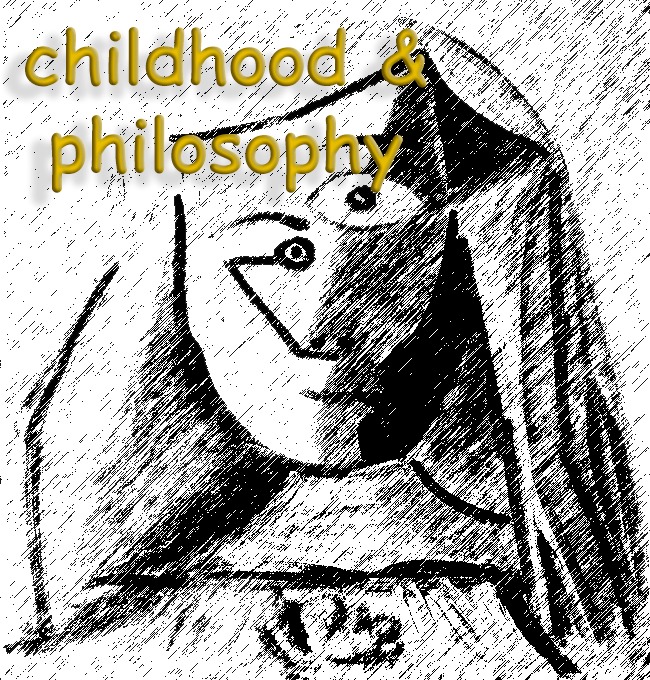forum theatre meets philosophy for/with children: physically exploring challenging situations in the community of philosophical inquiry
DOI :
https://doi.org/10.12957/childphilo.2021.53904Mots-clés :
forum theatre, philosophy for/with children, theatre of the oppressed, physicality, drama educationRésumé
This paper introduces Augusto Boal’s theatre practices, specifically forum theatre, to the Philosophy for/with Children [P4wC] movement. By connecting Boal’s pedagogy with P4wC, we show how forum theatre techniques can empower child-participants to physically engage in Communities of Philosophical Inquiry [CPIs] centered on challenging situations that they experience. To do this, we introduce and summarize aspects of Boal’s pedagogy, including his theoretical insights and methodological frameworks, with extensive reference to his book Theatre of the Oppressed. We follow with a discussion of some of the connections between the Theatre of the Oppressed movement and P4wC; specifically, we look at these movement’s similar conceptions of the relationship between self and community, and the similar methodological role of both stimuli and facilitators. We end by laying out several ways in which theatre practitioners and educators have used forum theatre with children, and suggest how P4wC facilitators might utilize Boal’s methods within CPI. We argue that Boal’s work offers methodological tools and theoretical insights that can supplement the P4wC movement by creating more physical, creative and inclusive spaces for philosophical engagement. Ultimately, we contend that the unification of these two movements has much to contribute to the ongoing development of pedagogical practices in P4wC. Thus, we call for more research regarding Boal’s methods, as well as other participatory theatre practices, in the practice of CPI.
Téléchargements
Références
Babbage, F. (2018). Augusto Boal. Routledge.
Boal, A. (1992). Games for Actors and Non-Actors (A. Jackson, Trans.). Routledge.
Boal, A. (2008). Theatre of the Oppressed (C. A. McBride, M.-O. L. McBride, & E. Fryer, Trans.). Pluto Press.
Brett-MacLean, P., Yiu, V., & Farooq, A. (2012). Exploring Professionalism in Undergraduate Medical and Dental Education through Forum Theatre. Journal for Learning through the Arts: A Research Journal on Arts Integration in Schools and Communities, 8(1). http://escholarship.org/uc/item/50p2s33s
Chan, Y.-L. J., & Chan, B. Y. Y. (2015). Applying Forum Theatre as a Community Design Method: A Collaboration Between Landscape Architecture and Theatre Education.
P-e-r-f-o-r-m-a-n-c-e, 2(1–2). http://www.p-e-r-f-o-r-m-a-n-c-e.org?p=3456
de Bruyn, A. D. (2018). Educating the Philosophical Imagination [Degree of Masters]. Columbia University.
Desai, S. R. (2017). Utilizing Theatre of the Oppressed Within Teacher Education to Create Emancipatory Teachers. Multicultural Perspectives, 19(4), 229–233. https://doi.org/10.1080/15210960.2017.1347875
D’Olimpio, L., & Teschers, C. (2015). Playing with philosophy: Gestures, performance, P4C and an art of living. Conference for The Philosophy of Education Society of Australasia (PESA).
Dwyer, P. (2005). “Theoria Negativa”: Making Sense of Boal’s Reading of Aristotle. Modern Drama, 48(4), 635–658. http://dx.doi.org/10.3138/md.48.4.635
Freire, P. (2000). Pedagogy of the Oppressed (M. B. Ramos, Trans.). Bloomsbury Academic, an imprint of Bloomsbury Publishing Inc.
Gardner, S. (2017). Human Agency: Its Pedagogical Implications. International Journal of Applied Philosophy. https://doi.org/10.5840/ijap20181485
Gourd, K. M., & Gourd, T. Y. (2011). Enacting Democracy: Using Forum Theatre to Confront Bullying. Equity & Excellence in Education, 44(3), 403–419. https://doi.org/10.1080/10665684.2011.589275
Gregory, M. R. (2007). A Framework for Facilitating Classroom Dialogue. Teaching Philosophy, 30(1), 59–84. https://doi.org/10.5840/teachphil200730141
Hall, D. (2003). Philosophy, Power and Performance. Analytic Teaching, 22(2), 136–155. https://journal.viterbo.edu/index.php/at/article/view/762?fbclid=IwAR2QqCqN9tIkyNS-rabQOC-RyC_Wwq4SaLi1i0Xl4sVEhErrb82b1BaWHDk
Hamel, S. (2015). Translation between Academic Research, Community and Practice: A Forum Theatre Process. Canadian Journal of Action Research, 16(3). htt://journals.nipissingu.ca/index.php/cjar/article/view/226ps
Hammond, N. (2015). Forum Theatre for Children: Enhancing Social, Emotional and Creative Development. Trentham Books.
Kohan, W. O. (2018). Paulo Freire and Philosophy for Children: A Critical Dialogue. Studies in
Philosophy & Education, 37, 615–629. https://doi.org/10.1007/s11217-018-9613-8
Lipman, M. (1992). Thinking in Education. Cambridge University Press.
Lipman, M., Sharp, A. M., & Oscanyan, F. S. (1980). Philosophy in the Classroom (2nd ed.). Temple University Press.
Ludwig, T. (2012). Just Kidding. CNIB.
Preston-Roedder, E. (2020). What Can Philosophy Learn from Improvisational Theater? Precollege Philosophy and Public Practice, 2, 18-35. https://doi.org/10.5840/p420204112
Reason, M. (2008). Thinking Theatre: Enhancing children’s theatrical experiences through philosophical enquiry. Childhood & Philosophy, 4(7), 115–145. http://ray.yorksj.ac.uk/id/eprint/913/
Rice, M., Newell, A., & Morgan, M. (2007). Forum Theatre as a requirements gathering methodology in the design of a home telecommunication system for older adults. Behaviour & Information Technology, 26(4), 323–331. https://doi.org/10.1080/01449290601177045
Schertz, M. (2007). Avoiding ‘passive empathy’ with Philosophy for Children. Journal of Moral Education, 36(2), 185–198. https://doi.org/10.1080/03057240701325308




